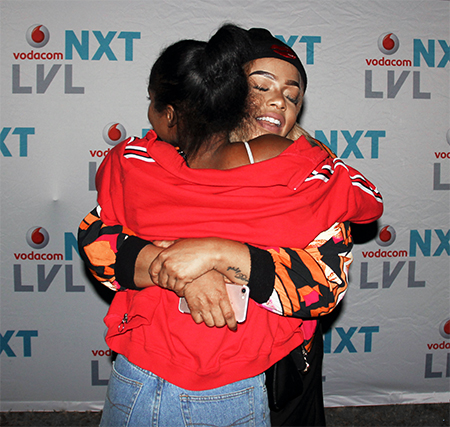Latest News Archive
Please select Category, Year, and then Month to display items
22 February 2018
Photo Johan Roux
 Prof Francis Petersen, Rector and Vice-Chancellor of the UFS.
Prof Francis Petersen, Rector and Vice-Chancellor of the UFS.

Shekhinah embraces students at the festival.
Photo: Monk Manyeloyi
A weekend that promised great excitement kicked off on Friday 16 February 2018 with the Kovsie ACT Eco-vehicle race. This event saw students teaming up in their respective colleges in high hopes of earning what was assured to be a gratifying reward. The overall winners of the race were North College who also won for team spirit, the slalom race, and the Formula-e lookalike.
Students at the race rumbled with excitement as they witnessed the Rector and Vice-Chancellor of the University of Free State Prof Francis Petersen get his hands dirty when he decided to test-drive one of the Eco-vehicles himself. “It was honestly an electrifying moment that proves that co-curricular activities have the power to indeed help shift education into the right direction,” said Dean of Student Affairs, Pura Mgolombane, who was seen alongside Prof Petersen.
The first official Kovsie ACT music festival was billed to rock Bloemfontein, and it did exactly that! With the gates opening at 4pm on 17 February 2018, the event saw people pouring in shortly afterwards. The community and student-centred celebration saw a turnout nothing short of amazing.
The evening included a laser show display that is always a crowd pleaser, with OFM radio-show host Shandor Potgieter as the official MC for the event. Festivalgoers were entertained by various musical acts that included Sam Ludidi and local DJ duo, C’jo-&-Cider.
The crowd rushed to the main arena as Jack Parow prepared to kick off with his piece, which undoubtedly revved them up. Shekhinah, of course, followed through with a thrilling performance that held fans at her mercy, with many shouting “Shekhinah!”, as she left the stage.
Prince Kaybee’s electrifying set ended off the night on a high note. The audience wanted more but the celebrations for the evening had to come to an end. “The festival was too lit, and the artists brought the heat, exactly what I needed before classes start on Monday,” said #KovsieCyberSta and student Thuli Molebalwa.
Kovsie ACT music festival
Inaugural lecture: World on verge of agricultural revolution
2008-05-19
|
 A changing economic climate and new technology will see to a number of interesting changes in the livestock industry in the next few years. This is according to Prof. Frikkie Neser of the Department of Animal and Wildlife and Grassland Sciences, who delivered his inaugural lecture at the UFS on the subject: “The quest for a superior animal”. A changing economic climate and new technology will see to a number of interesting changes in the livestock industry in the next few years. This is according to Prof. Frikkie Neser of the Department of Animal and Wildlife and Grassland Sciences, who delivered his inaugural lecture at the UFS on the subject: “The quest for a superior animal”.
Prof. Neser focused on the future of animal breeding in the next few decades.
He said the world, but especially South Africa, stand on the verge of a revolution in the agriculture sector. The whole production scenario will probably change. The high fuel and food prices are the two biggest factors that will play a role.
“Increasing fuel prices opened the door for the production of bio-fuel. The fuel industry is in direct competition with humans and the livestock industry for the same resource that result in unbelievable high prices for maize, sunflower and soya. These prices can further increase with the worldwide shortage of food,” he said.
More profitable breeds could take the place of existing breeds because of the big increase in input costs, he said. “Selection for more effective, and not maximum production, will became more important.
“There are also indications of pressure on feed lots. If this industry downsizes, it could lead to a total turnaround in the beef industry. The feed lots prefer a later maturing animal that can put on a lot of weight before fat is laid down. If this industry declines, early maturing breeds and some of the synthetic breeds, as well as crossbreeding with early maturing breeds, will play a more prominent role in the meat industry.
“This will also lead to a decline in the total number of animals in order to prevent overgrazing. This can result in an increase in imports from neighbouring countries and especially Brazil, where production costs are much lower.
“One way to increase the profitability of meat production is to utilise niche markets. There is world-wide a shift to more natural products. The demand for grass-fed beef drastically increased. According to research it is healthier than meat from feed lots and usually free of hormones and antibiotics. If factors such as traceability are put in place, this could be a very profitable niche mark for the South African meat industry,” he said.
Prof. Neser also said: “In order for breeding societies to survive they need to increase the number of members and the animals that are being registered. This they do by replacing the word stud with recorded animals. Hereby they open the door for excellent commercial animals to become part of the seed-stock industry. Another benefit is that especially in the smaller breeds more information becomes available, resulting in more accurate breeding values.”
Prof. Frikkie Neser.
|